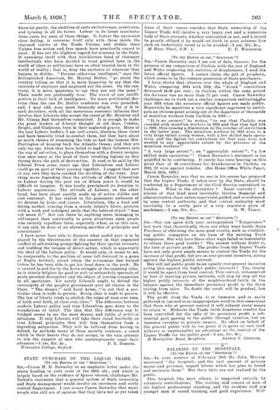[To THE EDITOR OF THE " SPECTATOR."] SIR, —One can agree
with your correspondent " Temperance " last week that theoretically there are other ways beside State Purchase of obtaining the same good results, such as establish- ing public companies on the lines of the existing Trust companies. But why have these other ways failed so lamentably to obtain those good results ? The answer without doubt is, the lure of private profit. The profits from the Liquor Trade. have not only given ample means to control the Trade for the increase of that profit, but are an ever-present incentive, acting against the highest publio interest.
But will not public profit be an equally ever-present incentive acting also against the higher public interests ? Yes, clearly it would be apart from local control. This control, unhampered by fear of injuring private interests, will step by step set the higher public interests of the neighbourhood fairly in the balance against the immediate pecuniary profit to the State arising from sales. No doubt the result will be gradual, but it will be effective.
The profit from the Trade is so immense and so easily gathered in (earned is an inappropriate word in this ceanexion) that those who at present control it will exhaust every means to retain it. Hitherto the Trade (with disastrous results) has been controlled for the sake of -its pecuniary profit, a sub- stantial part passing to the public through taxation, but an immense overplus to private owners. No effort on behalf of the general public will be too great if it gains so vast (and hitherto so unattainable) an advantage as the control of the Liquor Traffic for the public good.—I am, Sir, &c.,










































 Previous page
Previous page